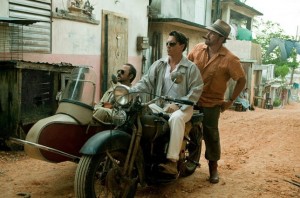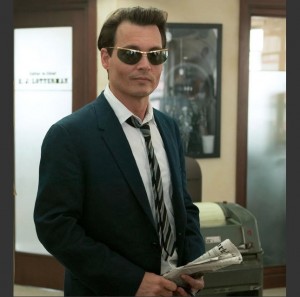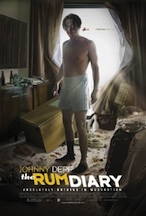ALL ABOUT JOURNALISM
(Reviewer’s note: What do you do when you really like a film but disagree with it? You write a review like this.)
I’ll start my review of The Rum Diary with a short explanation of why I ceased to be a journalist some time ago.
Very simply, I never knew a journalist in his 40s who wasn’t a deeply unhappy person. They were all poor, burned-out, and resentful. I remember once sitting in a job interview with the bureau chief of the Associated Press and listening in on a phone call with his wife about how in the world they were going to afford a minivan. And this was 1999, when they were practically giving away minivans with two bottles of Pepsi. And this was the state bureau chief of the Associated Press!
 That’s the first thing that you need to understand when you consider the self-righteous pose that journalists unfailingly assume. Because underneath that whole “afflict the comfortable and comfort the afflicted” routine are a lot of people who regret the choices they’ve made in their lives. And so they soothe themselves with a cocoon of self-righteousness that’s really unrequited envy. That’s understandable, because serving as the public watchdog is essentially one long, repetitive kamikaze raid against unstoppable American carriers, except, unlike kamikazes, journalists don’t get the relief of dying and missing the next morning.
That’s the first thing that you need to understand when you consider the self-righteous pose that journalists unfailingly assume. Because underneath that whole “afflict the comfortable and comfort the afflicted” routine are a lot of people who regret the choices they’ve made in their lives. And so they soothe themselves with a cocoon of self-righteousness that’s really unrequited envy. That’s understandable, because serving as the public watchdog is essentially one long, repetitive kamikaze raid against unstoppable American carriers, except, unlike kamikazes, journalists don’t get the relief of dying and missing the next morning.
The Rum Diary is the adaptation of Gonzo journalist Hunter S. Thompson’s novel about his times as a journalist in Puerto Rico, and Bruce Robinson’s film drips in newspaper ambience. Consequently, it’s very wise about newspapers and journalists. It has the wackjob cop reporter, the husky photographer who always appears to be sweating to death, and the harried editor beaten down by the demands of his job. It also gets the moral preening so right that it actually participates. While I really like the film for its amusing adventures and early-sixties- Mad-Men-tropical-division ambience, I come away with a very different take on the values it holds, for the stated reason.
 With rum-soaked deadpan bemusement, Johnny Depp plays Kemp, a new reporter at the worst newspaper in Puerto Rico. Kemp is a talented writer and a talented drinker who works at a newspaper short of the former and full of the latter. His adventures in Puerto Rico range from drinking to cockfighting to bowling to drinking. He pools his poor pay for a crummy apartment with a pair of oddball newsmen (Michael Rispoli and Giovanni Ribisi) who get high, drunk, or both, and watch the television through a window across the alley with binoculars.
With rum-soaked deadpan bemusement, Johnny Depp plays Kemp, a new reporter at the worst newspaper in Puerto Rico. Kemp is a talented writer and a talented drinker who works at a newspaper short of the former and full of the latter. His adventures in Puerto Rico range from drinking to cockfighting to bowling to drinking. He pools his poor pay for a crummy apartment with a pair of oddball newsmen (Michael Rispoli and Giovanni Ribisi) who get high, drunk, or both, and watch the television through a window across the alley with binoculars.
The so-called villain of The Rum Diary is Aaron Eckhart’s slick real estate man Sanderson, and for the life of me I can’t figure out what he’s doing that’s so wrong. Kemp comes to regard him as a criminal, but Sanderson’s crimes against humanity appear to be building a resort, having a hot girlfriend, and not being such an inebriated junkie screw-up that he can’t get to work in the morning.
 Seriously, what exactly does Sanderson do wrong in the film? He befriends a newcomer. He recognizes Kemp’s talent and invites him on a massive resort deal. He provides Kemp with a home, gives him a cool car, and pulls strings to bail him out of jail when his screw-up friends land him there. In return, Kemp violates his trust, swipes his boat and tries to steal his fiancée (The Pineapple Express’ Amber Heard, who’s pretty good at the ray of light part and not so good at the putting-emotion-into-her-line-readings part).
Seriously, what exactly does Sanderson do wrong in the film? He befriends a newcomer. He recognizes Kemp’s talent and invites him on a massive resort deal. He provides Kemp with a home, gives him a cool car, and pulls strings to bail him out of jail when his screw-up friends land him there. In return, Kemp violates his trust, swipes his boat and tries to steal his fiancée (The Pineapple Express’ Amber Heard, who’s pretty good at the ray of light part and not so good at the putting-emotion-into-her-line-readings part).
But here’s the real thing ’¦ Kemp doesn’t hate Sanderson. Kemp wants to be Sanderson. Honestly, he’s pretty cool with the whole high-life until his irresponsibility gets him kicked out of it. His self-righteousness doesn’t come from a well of conviction but from a well of sour grapes.
 The film indulges in pouring some “lovable losers” sympathy on its journalists, generally a bunch of drunk and disorderly idiots, as if they are somehow ennobled by their failures. They’re losers, they’re practically the Chicago Cubs, and we’re all supposed to love losers, especially when squared off against sweet-smiled successes like Sanderson. Except I really rather hated them. I was supposed to be cheering them on, but mostly I kept thinking Kemp should kick them out of his life, get his stuff together, and beg his way back into Sanderson’s graces. Because it’s like watching The Big Lebowski, except The Dude has actual talent and he’s wasting it by bowling with Walter.
The film indulges in pouring some “lovable losers” sympathy on its journalists, generally a bunch of drunk and disorderly idiots, as if they are somehow ennobled by their failures. They’re losers, they’re practically the Chicago Cubs, and we’re all supposed to love losers, especially when squared off against sweet-smiled successes like Sanderson. Except I really rather hated them. I was supposed to be cheering them on, but mostly I kept thinking Kemp should kick them out of his life, get his stuff together, and beg his way back into Sanderson’s graces. Because it’s like watching The Big Lebowski, except The Dude has actual talent and he’s wasting it by bowling with Walter.
All of this means The Rum Diary is a movie about alcoholics who can’t figure out that their problem is that they’re alcoholics. This makes The Rum Diary more like Bring Me the Head of Alfredo Garcia without the painful self-awareness.
Does that sound like a recommendation? Well, it is, even if it doesn’t. And a pretty strong one, actually. Good film.
The Rum Diary
rated R
now playing nationwide


{ 1 comment… read it below or add one }
Your view of the film is very close-minded. Sanderson is representative of the greed that is becoming the “american dream.” He wants to turn an island, that is a beautiful and pure place in nature, into a money making machine of a hotel resort. The film suggests that the island should not be a commodity that can be bought for a night at a time, but rather a place that people can share and enjoy together free of charge. Kemp would never have found his voice if he had stayed with Sanderson, he would have just become a part of the corrupt and greed-ridden system. In other words, he would be a sell out. He is taking the moral high ground by identifying what is wrong with society and reporting on it, much like Hunter S. Thompson did, whose life the movie is loosely based upon. The alcoholics are lovable because they are like real people, struggling to survive in a world where the rules are made against them, unlike the fake and corrupt people who hold the power. If you cannot identify with them then I assume you either have a problem with alcohol (which is fine) and are judging them only based on that, or you identify with the corrupt materialistic side of society (which is disturbing). Nice review… I guess.